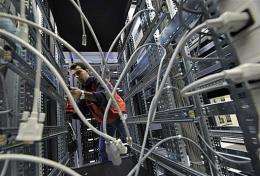A technician assembles computers at the European Organization for Nuclear Research's (CERN) Large Hadron Collider (LHC) Computing Grid room during its inauguration in 2008 in Geneva. Austria is pulling out of CERN, Science Minister Johannes Hahn announced Thursday, citing budget concerns.
Austria is pulling out of the European Organisation for Nuclear Research (CERN), Science Minister Johannes Hahn announced Thursday, citing budget concerns.
The 20-million-euro (26.9-million-dollar) yearly membership in CERN -- which is responsible for Europe's Big Bang atom-smasher -- makes up 70 percent of the money available in Austria for participation in international institutes and could be better used to fund other European projects, he said.
"I feel bad about every membership that we cannot keep up," Hahn told journalists.
But a choice had to be made between continuing work with CERN or encouraging other prospects for the future, he added.
Hahn said he hoped Austria could find "a new kind of cooperation" with CERN and described Vienna's withdrawal from the project as a "pause", noting that some 30 states were already working together with the Geneva-based centre without being members.
The science ministry was aiming "to enhance Austria's research profile" by participating in a variety of projects across a wide range of disciplines, and while CERN's work was high-profile, Austria's role in it was rather limited, said Hahn.
The newly-available funds will now allow Austria to take part in new European projects, boost its participation in old ones as well as help the Austrian Science Fund (FWF), the country's main organisation funding research.
But top Austrian scientists criticised the move Thursday, just months before the CERN is due to relaunch the Large Hadron Collider (LHC), a 27-kilometre (17-mile) multi-billion-dollar underground particle accelerator designed to shed light on the "Big Bang."
"This is a catastrophe," said renowned Vienna physicist Walter Thirring, who headed CERN's theory group from 1968 to 1971, warning that other states could follow Austria in pulling out of the organisation.
The head of the Austrian Institute of High Energy Physics, Christian Fabjan, meanwhile called it a "black day for Austrian research."
Austria, which has been a member of CERN since 1959, just needs formal approval from parliament and the government now to pull out of the organisation. Its membership could then end officially in late 2010.
(c) 2009 AFP



















